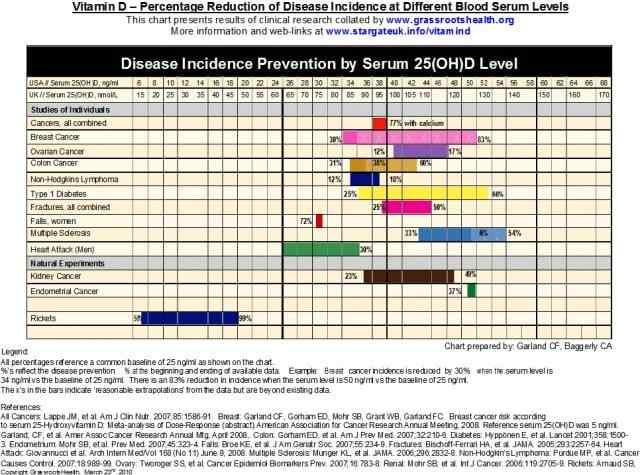Vitamin D: The Hormone that Can Save the Most Lives

Responsible for everything from building strong bones to lowering our risk of serious diseases, vitamin D (calciferol) should be deemed as one of the most important vitamins our bodies need. It can affect a litany of critical systems that you need to function properly including your cardiovascular system, thyroid function, mood, brain function, pain perception – I think you get it. If you’re not getting enough vitamin D, your body is missing an incredibly valuable component that it needs to function as optimally as possible.
Unfortunately, we’re simply not getting enough of it.
Vitamin D deficiency has grown to be such a big problem internationally that all age groups, from children to the elderly, are at risk. The problem in the United States is at an all-time high with just over 40% of adults being deficient in vitamin D. Even younger adults are not immune; as many as 36% of adults between 18 and 29 face vitamin D deficiency. The problem is further compounded for certain ethnic groups. About 69%of Hispanic adults and about 82% of African American adults are suspected of having vitamin D deficiencies.

There are lots of reasons why we’re all so deficient, but we’ll just recap the top 3 most likely contributors.
First, we’re not getting it through the foods we eat. Consider that one egg contains on average of 20IU of vitamin D. Even if you were to eat 2 per day, that’s only 40IU of vitamin D when the recommended daily intake is anywhere from 600-800IU. Even in you were to add a cup of milk (100IU), and 3.5oz of salmon (360IU), you’re hardly getting to the lower limit of the recommended daily intake.
Secondly, we’re almost always living indoors. Just think about the amount of time you’ve spent outside since the pandemic started. It’s pretty dismal, right? And to add insult to injury, we’re constantly covering up with as much skin as possible to either prevent sun exposure - which we’ve all been warned will cause skin cancer, or to preserve our fare skin. We’re living indoors and covering up – keeping the sun away from our skin which is how we make vitamin D in the first place!
Third, we don’t supplement with enough of it due to outdated recommendations on what the daily intake should be. Those established limits were based on values that were just enough to keep us from getting severe bone deformation due to poor mineralization know as Rickets. How can the daily allowance be set so low when our bodies are able to generate as much as 26,000IU per day in the sun?
Sadly, all if these factors have contributed immensely to increasing our risks of everything from cancer to diabetes.
Because vitamin D is such a critical part of functional health, a deficiency can be detrimental to our health in so many ways. People who do not have optimal levels of vitamin D can have higher risks of the following conditions.
-
Muscle Pain - 71% of those with chronic pain are deficient
-
Hair Loss - People with alopecia and low vitamin D have greater hair loss
-
Bone Loss - There is a strong link between low vitamin D and low bone mineral density
-
Compromised Healing - Vitamin D helps with cell regeneration necessary for wound repair
-
Depression - 65% of observational studies have shown a link between low D and depression
-
Fatigue - Low levels of vitamin D are highly associated with fatigue and low life quality
-
Illness - Vitamin D works with the immune system to fight illnesses like the flu, bronchitis, and pneumonia
People with vitamin D deficiency may also be at risk of more fractures, a greater chance of experiencing a fall due to bone and muscle weakness, and more. In addition to being at risk of a number of general health problems, not getting optimal levels of vitamin D can also mean you are more prone to certain diseases.
Dementia
People with low vitamin D may be twice as likely to develop either Alzheimer's disease or other forms of dementia. While the research to date is merely observational, this observation could potentially lead to new knowledge of lowering risks of dementia for the elderly.
Arthritis
Vitamin D helps nerves communicate, fights inflammation, and helps the bones in your body absorb and utilize calcium. Vitamin D deficiency is a common factor for people with different types of arthritis, including osteoarthritis and rheumatoid arthritis.
Heart Disease
Low vitamin D levels are linked to various types of heart disease and heart attack. Stable blood serum levels of vitamin D at 34 ng/ml may reduce your chances of heart attack by as much as 30%.
Diabetes
Vitamin D helps to keep inflammation within the body in check, and inflammation can make the body more resistant to insulin. Plus, lacking vitamin D can lead to cell death that contributes to diabetes. Therefore, low vitamin D levels can mean you are more at risk of both type 1 and type 2 diabetes.
Multiple Sclerosis
Upping vitamin D intake may help thwart your risks of multiple sclerosis. With serum levels of 54 ng/ml, the risk of MS may be reduced by as much as 54%. When you consider people with less exposure to the sun are also more at risk of MS, it is easy to see why there may be a connection to lacking vitamin D levels and MS risks.
Periodontal Disease
In dental patients with periodontal disease, serum vitamin D levels have been found to be much lower. For those with chronic periodontal disease, the most significant difference in vitamin D has been noted.
The truth is that If you have been following the outdated recommendations for vitamin D intake of between 600 and 800IU daily, you may actually still be at risk of deficiency. Recent research indicates that the most optimal levels of vitamin D serum levels may be between 40 and 70 ng/ml (Nanograms per milliliter).
This means that an optimal level of vitamin D to take in is between 1,000 and 15,000 IU daily. A good rule of thumb to remember when searching for the right amount of vitamin D for you is, each 100IU of vitamin D3 intake will likely increase your blood serum levels by 1ng/ml.
Remember, this is only a starting point and absorption will depend a lot the health of your gut, and whether or not have eaten a meal. In fact, vitamin D taken after large meals may improve absorption and levels by as much as 50%! And of course, less is needed if you get more sun exposure.
Check out these Cancer Benefits!
In all, vitamin D deficiency is linked to 17 different types of cancer, including some of the most prevalent, like breast, prostate, kidney, and colon cancer. All cancers combined may be 35 percent less likely with serum vitamin D (OH) levels of just 38 ng/ml. However, some types of cancer seem to be highly associated with low vitamin D levels.

From the clinical research presented above:
-
Risks of breast cancer may be reduced by 83% with 50 ng/ml serum levels of vitamin D
-
Risks of colon cancer may be reduced by up to 60% with just 42 ng/ml of vitamin D
-
Risks of kidney cancer may be reduced 49% with 48 ng/ml levels of vitamin D
Some estimates state that anywhere between 39 and 75% of all cancers combined may be preventable with optimal vitamin D intake levels and serum ranges of at least 25 ng/ml.
As pharmacists, I think we’re all tired of seeing our titles being used on bottles as the brand most pharmacists trust. In fact, I can tell you that in the 100+ years of combined experience our pharmacists have practiced, we’ve never once participated in those bogus types of surveys.
Here is what you need to know.
# 1 - Protect Your Health with a Trustworthy Vitamin D Supplement
With vitamin D being such a critical part of your overall health, you will no doubt want to make sure you are getting an adequate intake every day. So, beware of the low-cost leaders and the even supplements from leading retailers. The dietary supplement industry is rife with low-standard manufacturers due in part to lack of FDA oversight. Supplements of all kinds have made the news a number of times because they are either not what is advertised on the label or contaminated with heavy metals or questionable agents.
Look for companies that follow especially stringent standards and are offered by a reputable manufacturer. Otherwise, you may be taking something that could either be detrimental to your health or not supplying the actual level of support your body needs.
# 2 - Make Sure you Get the Right Amount of Vitamin K with your Vitamin D
Don’t forget the Vitamin K! About 70%of the western population is deficient in vitamin K2; and vitamin K2 is valuable when taken in conjunction with vitamin D3. Vitamin K2 works in synergy with D3 to ensure that calcium is properly utilized in the body. It keeps the calcium from building up in the cardiovascular system and helps mineralize it into the bone where you want it.
Vitamin K2 is also an agent that helps your blood to clot, so if you’re taking any blood thinners like warfarin, make sure you advise your doctor before you add it into your daily ritual.
# 3 – TAKE the Right Kind, and Right Amount of Vitamin D
Vitamin D is available in two different forms, D2 and D3. Vitamin D3 is the preferable form as it has been found to maintain vitamin D levels in the body for a longer period of time when compared to vitamin D2.
Given these factors, our pharmacists recommend vitamin D supplements from Ortho Molecular Products over any other brand. Each of their supplements is created to the most stringent standards by true professionals in medicine and science.
Taking the right amount can also be challenging. Starting with the rule of thumb is a good starting place.
Each 100IU of vitamin D3 intake will likely increase your blood serum levels by 1ng/ml
Therefore, if my vitamin D levels were 18ng/dl, and I want to increase it to 50ng/dl, I have 32ng/dl (50IU-18IU) to make up for. Multiplying the rule of thumb 100IU by the amount I want to increase it by (32IU) gives me 3,200IU that I need to start increasing it by.
If this seems complicated, don’t worry – you can always speak to one of our pharmacists to help you figure out the right amount for you.



